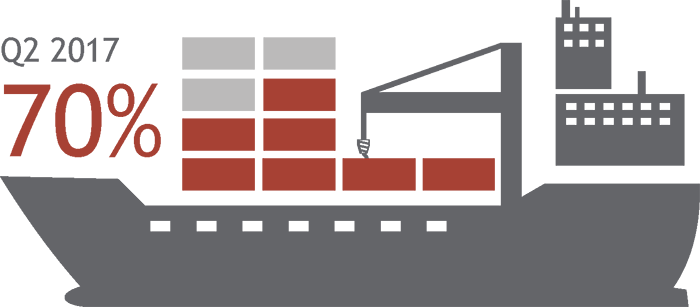
Companies looking to thrive must think further ahead than just March 2019
It is clear from our research that entrepreneurs and scale-ups that do export are confident of increasing turnover, although there are some concerns about the financial health of non-UK trading partners.
However, it’s not just Brexit that business needs to be aware of. As the world becomes smaller, in trading terms, then all businesses need to start planning for the future. Any entrepreneur, and their business, needs to be adaptable and nimble enough to survive any short-term business and economic impacts.
Would-be exporters unconvinced
The Office of National Statistics reported in July that the trade deficit widened to £8.9bn in Q2 2017, thanks to an increase in imports and a decrease in exports.
Our research suggests that the government is failing to get the message across: it is neither persuading the public that it wants to encourage businesses to expand overseas nor that Britain is open for business.
A reason why government is failing to convince domestic companies to become exporters is the perceived roadblocks in their way. These hurdles can include a lack of access to market information, a shortage of international touchpoints, insufficient access to finance and an unclear understanding of the role that companies play in their respective supply chains.
Relocation, relocation, relocation
In advance of whatever Brexit may look like, companies have already started planning for their future. International businesses looking to relocate staff to new centres (European and further afield) have set this planning in motion, as personal issues come to the fore.
The school year starts in September; for any executive looking to move in 2018, planning has to start over the next month or two. The decision to move a family is not an overnight process. Companies hoping to keep hold of their executives need to have relocation in mind now.
The same is true for businesses and their clients. There may be a need to shift more business to Europe, to find ways to innovate in order to hold on to current clients and generate new sources of revenue.
Every business looking to survive in the short term must have international expansion on their mind, regardless of Brexit. It may not be appropriate for all but it needs to be considered before it is too late.
If your business exports, do you expect your turnover to increase in the next 12 months?

International markets: stayin’ alive
If the short term need is for companies to relocate in order to avoid falling foul of Brexit, the medium term requirement is no less urgent. Quite simply, British businesses need to remain relevant to both domestic and international customers; they can do this by identifying the need in other markets and shifting what they offer to match this need.
There is a danger that British companies might focus excessively on the immediate impact of Brexit and ignore other, arguably, more global factors. President Trump’s protectionist policies and their impact on global trade are a far greater concern to many.
Closer to home, Europe seems to have regrouped after the initial Brexit shock and pressure, though broader risks remain; the forthcoming elections in Europe will be the latest test of regional stability.
Is the financial health of your trading partners improving?
Brexit – just another bump in the road?
Looking further ahead, the very shape of business is changing. Disruption, both a buzzword and a threat, is now becoming the norm; companies driven by innovation are having a dramatic effect on how businesses achieve their growth.
For example, in the context of changing legislation, favouring the development of alternatives to diesel engines, Tesla’s expansion in Europe probably poses a much more serious long term threat to German automotive trade than Brexit does.
Faced with disruptive innovation, uncomfortable choices are becoming more apparent. Should companies adapt their business to supply more components to international markets, or should they investigate ways in which to support and be a part of innovation?
It is clear that scale-ups and smaller businesses looking to survive in the post-Brexit world should find ways to avoid or manage the seemingly inevitable bump in the road. A longer term view is required.
DISCLAIMER
By necessity, this briefing can only provide a short overview and it is essential to seek professional advice before applying the contents of this article. This briefing does not constitute advice nor a recommendation relating to the acquisition or disposal of investments. No responsibility can be taken for any loss arising from action taken or refrained from on the basis of this publication. Details correct at time of writing.
Disclaimer
This article was previously published on Smith & Williamson prior to the launch of Evelyn Partners.

